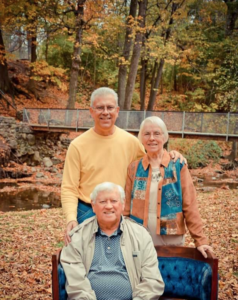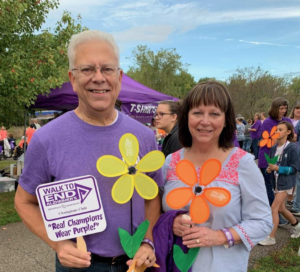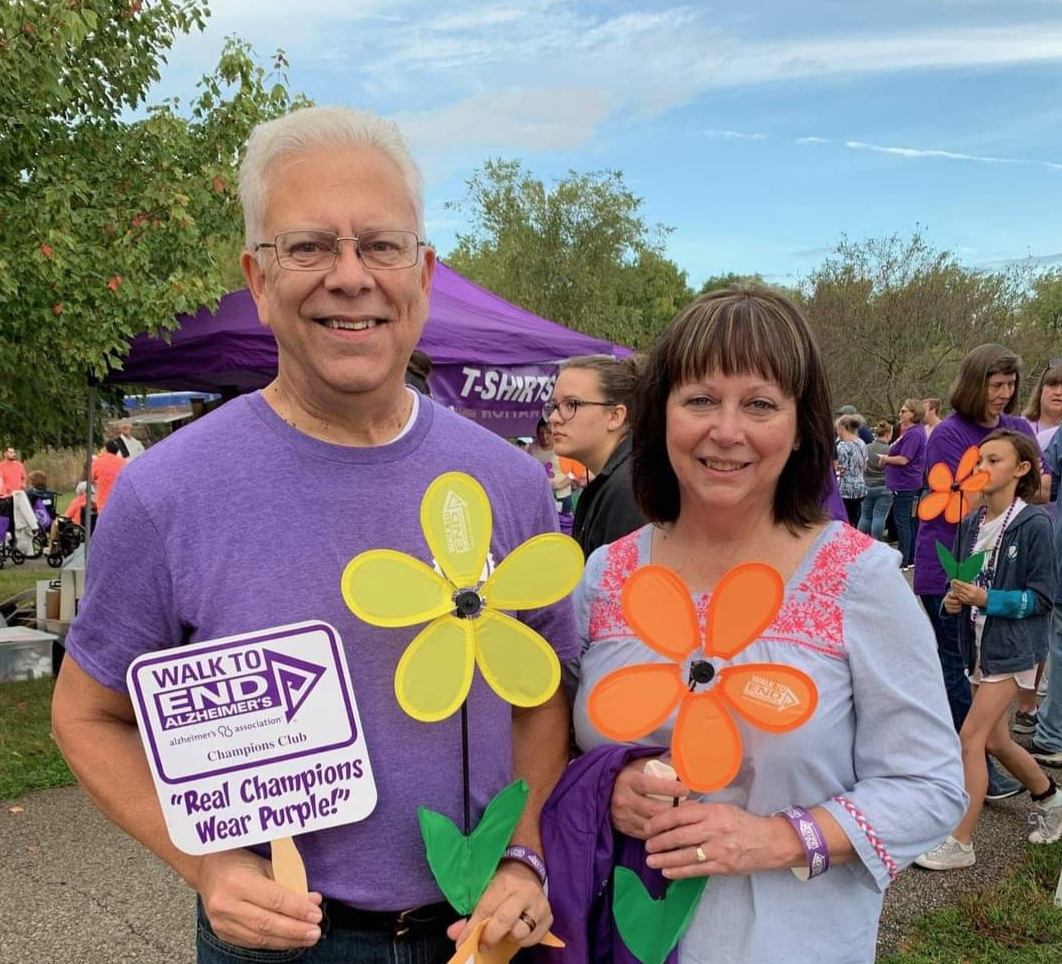Photography Provided
When Phil Petty, an only child and self-proclaimed momma’s boy, found out that his precious mother had been diagnosed with Alzheimer’s dementia, he felt compelled to do something, but what?
“As an engineer, I’m a problem solver by nature and yet this was a problem I realized I couldn’t do anything about on my own so I started seeking out help,” says Petty, who stumbled across the Alzheimer’s Association of Greater Indiana and learned that they were planning a Walk to End Alzheimer’s event in Kokomo. Upon learning that 78 cents of every dollar goes toward research to raise awareness and education to end the stigma of the disease and to help families learn how to better cope and assist their loved ones, Petty was all in.
 “Society looks at it as, ‘Oh, it’s just people getting old,” Petty says. “They don’t understand that this is truly a disease — one where they are drifting away from people who are right in front of them.”
“Society looks at it as, ‘Oh, it’s just people getting old,” Petty says. “They don’t understand that this is truly a disease — one where they are drifting away from people who are right in front of them.”
Petty, Technical Director at Mahar Tool Supply, had already been a huge fundraising advocate for several local organizations, including Kokomo Men’s Rescue Mission, CASA (Court Appointed Special Advocate for kids), ARC (Autism Resource Centre), and Turning Point, which helps recovered opioid addicts get re-acclimated into normal life.
Two years ago, when Petty met with Katie Griffin, development manager for the Alzheimer’s walk, and Anne Murray, director of development with the Indiana Alzheimer’s Association, he presented them with a $19,000 check the company had raised. Not surprisingly, they were eager to get Petty more involved and asked him to become committee chair for the walk the following year.
“I was excited to get started, but then COVID-19 threw everyone for a loop,” Petty says.
Last year the walk was virtual, but this year’s event will be held on Saturday, October 2, in downtown Kokomo at Foster Park. There will be sponsors with tables of information to teach community members about the disease and how to deal with it. They will also share the toll-free hotline that anyone can call 24/7 to speak to a skilled certified person that can help family members when they are in need of counsel, even if it’s at 3 a.m.
Participants can either do a one or two lap walk. They have close to 60 walk captains, and each person on every team is asked to raise at least $100. So a 10-member team would be challenged to raise $1,000. The opening ceremony will take place on the main stage, on the corner of Superior and Washington Streets.
Typically, between 400 and 600 people show up for the walk though they are anticipating a larger crowd this year since everyone is itching to break out and do something together and in person.
“I would be thrilled if 800 or 1,000 people come,” says Petty, who believes that people want to be a part of something bigger than they are and this provides the perfect opportunity.
“Three years ago, I didn’t know this organization existed, let alone that there was a local walk. Now, I’m taking a leadership role,” says Petty, whose dad also now has vascular dementia after suffering a series of mini strokes.
As for his mom, most of Petty’s communication with her is through body language, facial expressions, and the twinkle in her eye.
 Petty, nicknamed “The Renaissance Man” for his ability to think way outside the box, set a lofty goal for his team this year. He told them that if they raised $10,000, he will let his granddaughter dye his white hair bright purple to represent Alzheimer’s. He also promised that for every additional $1,000 raised, he will keep it that color for an extra day.
Petty, nicknamed “The Renaissance Man” for his ability to think way outside the box, set a lofty goal for his team this year. He told them that if they raised $10,000, he will let his granddaughter dye his white hair bright purple to represent Alzheimer’s. He also promised that for every additional $1,000 raised, he will keep it that color for an extra day.
“Well, I’m going to be purple for opening day [on October 2] and will probably be purple through Halloween!” says Petty, who says his colorful hairstyle will give him a chance to share information about his cause, which, by extension, reduces the stigma.
“You find that there is no stigma if we get beyond the barrier and get people talking,” says Petty, who at a recent charity golf fundraiser, asked participants to raise their hands if they had a family member, friend, or associate who was currently living with Alzheimer’s. Every hand went up.
“People say, ‘I never knew there are so many dealing with the same thing I’m dealing with,’” says Petty, who has heard a lot of people say they were shocked to learn that such a huge organization exists.
“This is why it’s so important to raise awareness,” Petty adds. “It’s pretty hard to get help when you don’t know something is out there.”
Once people know, they want to get connected and inspire others.
“We can all do more, but it takes us working together,” Petty says. “When we act as a whole, we become pretty formidable.”
To learn more about this event, Google “Kokomo Walk to End Alzheimer’s.”




